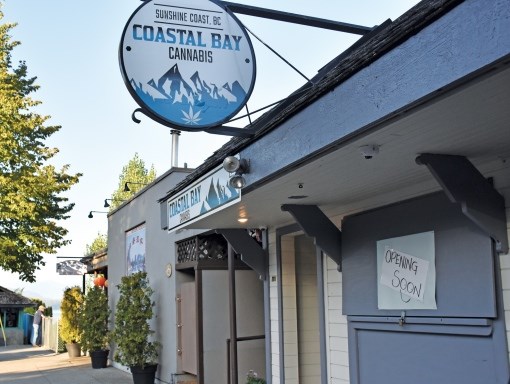The Gibsons planning and development committee is recommending the Town move forward with draft bylaw amendments that would require spot zoning for cannabis retailers or producers, and develop a policy that would set out how those applications would be assessed.
A written report from director of planning Lesley-Anne Staats said staff favoured that option because it “maintains firm control over the cannabis market in Town,” although the consulting firm Impact Resolutions recommended allowing retail cannabis stores in all retail zones, subject to buffer zones around schools and between other cannabis retailers.
The co-owner of Coastal Bay Cannabis on Marine Drive in Gibsons, which is also the only shop on the Sunshine Coast with a provincial licence so far, told the committee that she would prefer to see something closer to the Impact Resolutions recommendation.
Brenda Harris said having to go through the process of getting a temporary use permit (TUP) and then a site-specific zoning would make the process lengthy and complicated.
She gave the example of looking at a second location and needing to commit to a lease, but with no assurance the zoning would be approved, or even considered in a timely manner. “One of the biggest downfalls I see in the rezoning reasoning is that instead of you considering our application today, or next week, or next month, it would drag that on for eight months while [the property] gets rezoned,” Harris told the committee.
Coastal Bay is currently under a TUP, with a three-year term and an option to renew for a further three years.
The committee asked that the draft policy to be presented to council look at buffers around schools and between stores, as well as capping the total number of cannabis retailers or producers in town and storefront form and character guidelines.
Mayor Bill Beamish said he wanted to make sure the next step would be community consultations.
“I don’t think there’s a short answer to this process. Even though there was a consultation, the list of organizations that were consulted with pretty much all had a special interest in the process,” said Beamish. “I would certainly want us to have some consultation and discussion with the community.”
The Impact Resolutions report also includes a long section on advocacy, prompted by some of the input they heard in talking to stakeholders in the cannabis sector, who told the consultants that “one of the most serious economic issues facing the Sunshine Coast right now – the barriers facing local cannabis growers from transitioning into the legalized, licensed supply chain – seems to be slipping under the radar of all levels of government.”
As a result, they recommended that Gibsons encourage the federal government to “support licensing for small craft cannabis cultivation and processing in communities with a strong pre‐existing cannabis economy such as the Sunshine Coast.”
Silas White of Impact Resolutions also told the committee the Town should consider working with other local governments, Community Futures and the Sunshine Coast Regional Economic Development Organization to look at a “cannabis business transition program.” A similar initiative to get Kootenay region growers out of the black or grey markets and into the legal system recently received provincial funding.
Coun. Annemarie De Andrade noted that supporting local producers would fit the recently adopted strategic plan’s call for council to support local business and foster a diverse local economy.



